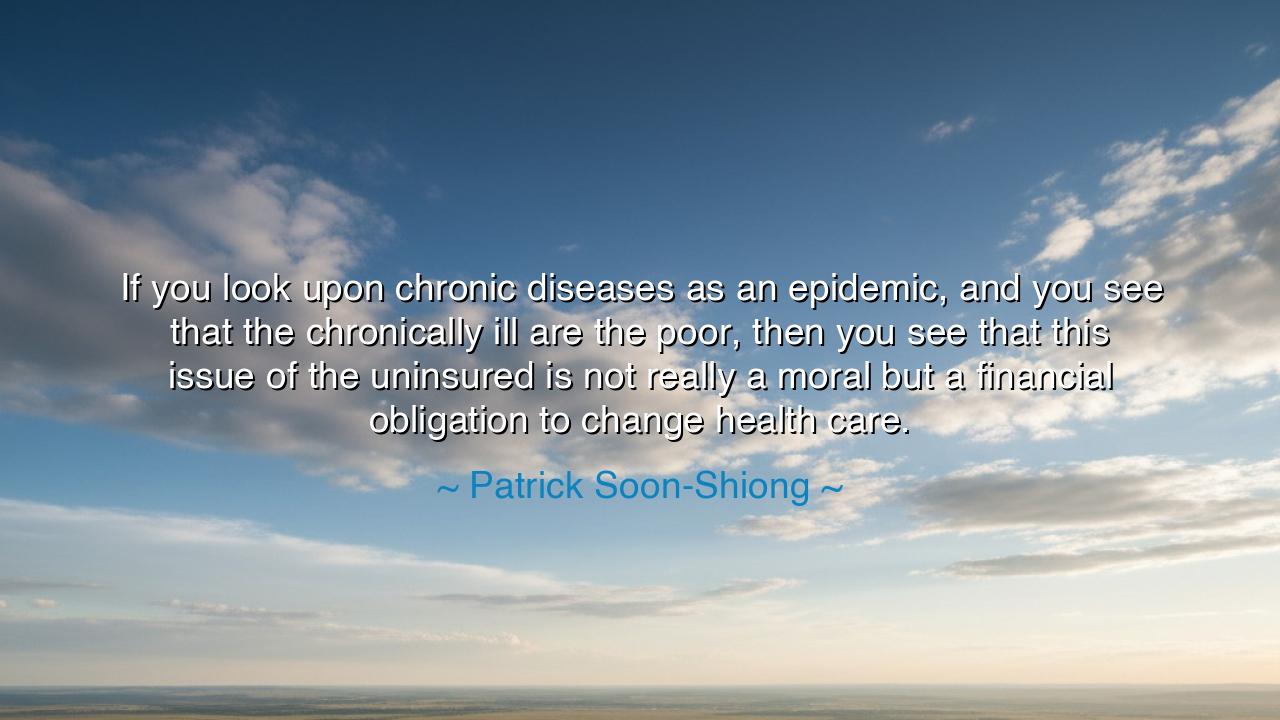
If you look upon chronic diseases as an epidemic, and you see
If you look upon chronic diseases as an epidemic, and you see that the chronically ill are the poor, then you see that this issue of the uninsured is not really a moral but a financial obligation to change health care.






“If you look upon chronic diseases as an epidemic, and you see that the chronically ill are the poor, then you see that this issue of the uninsured is not really a moral but a financial obligation to change health care.” — thus spoke Patrick Soon-Shiong, the healer, the innovator, the modern alchemist of medicine who seeks to turn compassion into cure. His words are not merely those of a physician, but of a prophet who perceives the deeper illness of society. For he reminds us that disease is not only of the body, but of the system; that poverty and illness are bound together in a cruel alliance; and that healing the sick cannot be the charity of the few, but the duty of all.
Soon-Shiong’s wisdom arises from the modern battlefield of medicine — a world where technology and wealth have reached dazzling heights, yet millions still suffer without care. In his words, he redefines the meaning of epidemic. Traditionally, an epidemic is a plague that spreads swiftly, striking without mercy. But Soon-Shiong reveals a subtler, slower contagion — that of chronic disease, quietly consuming the lives of the poor. These are not sudden outbreaks, but enduring afflictions: diabetes, heart disease, cancer, hypertension — ailments that thrive where access to care is scarce, where nutritious food is a luxury, and where work is hard but hope is frail. If such suffering spreads unchecked, it is not misfortune, but an epidemic born of neglect.
He then turns our gaze from morality to economics, though the two are intertwined. The moral heart may weep for the sick, but the wise mind must also see the practical truth: a nation that leaves its poor to suffer will pay the price in endless cycles of loss. The sick cannot work, the dying cannot contribute, and the burden of untreated illness grows until it consumes the wealth of the whole. Thus, Soon-Shiong declares that this is not simply a question of ethics — it is a question of sustainability. To heal the poor is not only right; it is necessary. To ignore them is to destroy the very foundation of prosperity.
Consider the history of the Industrial Revolution, when factories rose and cities swelled, but the workers lived in filth and disease. The powerful of that time saw no reason to act until the epidemics came — cholera, typhus, tuberculosis — spreading from the slums into the homes of the wealthy. Only then did governments awaken to the truth: public health is collective wealth. When sanitation improved and hospitals opened to all, the productivity of nations rose. The lesson of history is clear — when the poor are healed, the whole society thrives. Soon-Shiong’s words echo this ancient pattern: what we call compassion is in truth also self-preservation.
Yet there is more than pragmatism in his teaching. Beneath his call for reform lies a vision of interconnectedness — the understanding that the body of humanity is like the human body itself. When one organ suffers, all feel the strain. To treat illness as someone else’s problem is as foolish as ignoring the pain of one’s own heart. The uninsured are not strangers, but members of the same body — their weakness diminishes our strength, their healing enriches our health. Thus, to reform health care is not an act of generosity; it is the restoration of balance to the living organism of society.
The lesson, then, is both moral and practical: we must see health care not as a commodity, but as infrastructure, as essential to the strength of a nation as its roads, its armies, its schools. To heal the poor is to invest in the future; to leave them sick is to mortgage that future in suffering. Let leaders, therefore, craft policies not for profit, but for people. Let citizens support systems that protect every life, for the value of a civilization is measured not by its wealth, but by how it treats its weakest members.
So, my children of this restless age, heed the wisdom of Patrick Soon-Shiong. Look upon chronic disease not as the burden of others, but as the fire that spreads in the forest we all inhabit. Let us fight it together — through compassion, through innovation, through reform. Support the hospitals that serve the poor, the programs that teach prevention, the leaders who dare to put health before greed. For when the body of the people is whole, the soul of the nation is strong. And when the sick are healed, the heart of humanity itself beats once more in rhythm with justice, mercy, and truth.






AAdministratorAdministrator
Welcome, honored guests. Please leave a comment, we will respond soon